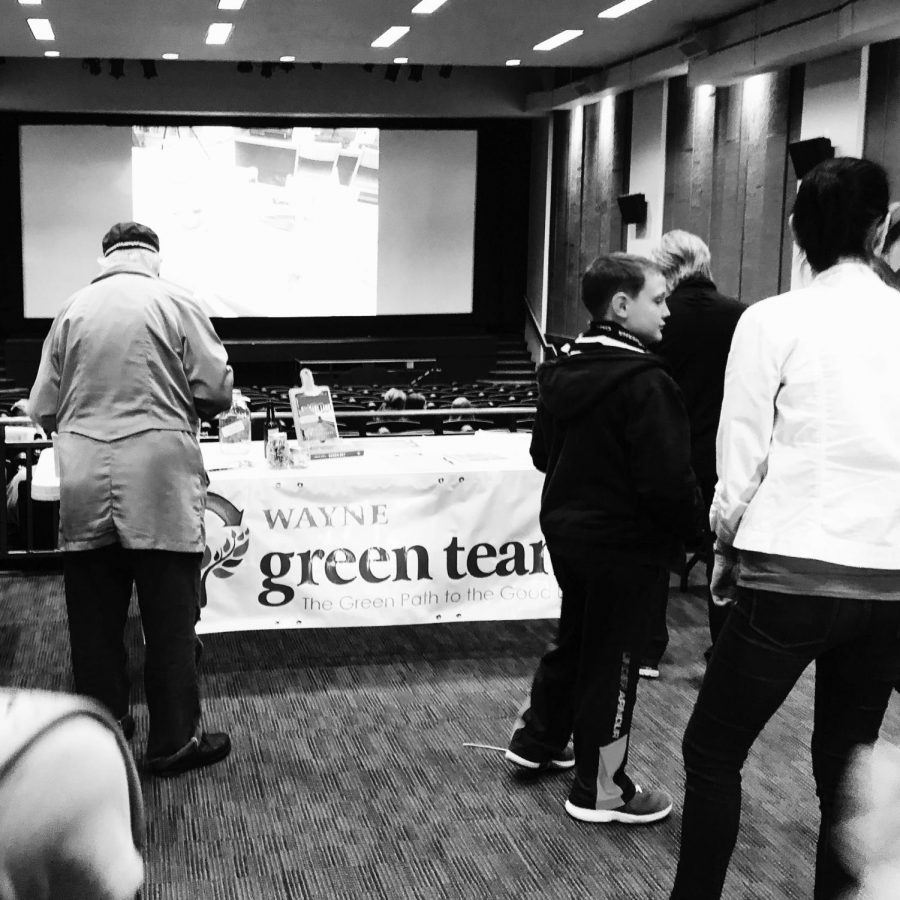Earth Day celebrated with documentary
‘Tapped’ presented viewers with the dangers of environmental carelessness
The City of Wayne Green Team, WSC Green Team, and the A. Jewell Shcok Natural History Museum teamed up to present ‘Tapped,” a documentary from 2009. Before “Tapped” was shown, sponsors presented ways to reuse and recycle items.
April 17, 2019
In sponsor of Earth Day, the City of Wayne Green Team, WSC Green Team, and A. Jewell Shock Natural History Museum presented the documentary “Tapped” which was shown at the Majestic Theatre in downtown Wayne on April 14 to present the problems of pollution, the importance of recycling and how accessing basic drinking water is a complication for some here in the United States.
Before the documentary started, the sponsors had tables set up to present different ways to reuse and recycle items. With flyers and many handouts, goers to this event learned many different ways to recycle products and even choose products that will better the earth.
Take this for example, every toothbrush that you have ever used is still here on earth somewhere.
The documentary began with the statement of “by the year 2030, ⅔ of the world will be lacking access to drinking water.” With many corporations taking over the planet with manufacturing plants and distribution at an all time high, the towns where the plants are located are running out of basic water options.
The locals in these towns are running out of ways to have drinking water, mow their lawns and wash cars because the companies are using the basic drinking water and bottling it. Pepsi and Coke are two of those large corporations that were used as an example in the documentary.
The documentary presented different spokespersons for these large corporations and these spokespeople couldn’t admit that tap water is the biggest competition for them, which had many people in shock because, as the documentary stated, it is.
Another shock to audience members was the fact that the FDA doesn’t regulate these large companies and their distribution processes or water quality testing because if it is distributed in the same state that it is processed in then it doesn’t have to be regulated by the FDA. The companies are not required to submit a regular water quality report to the FDA.
Public water companies are required to make their water quality report public. The FDA spokesperson stated that the corporations do not have to make theirs public. This led to another issue of how ‘good’ is the water that these corporations are bottling.
The documentary presented seven tests of the corporations bottled water to two different labs to see what chemicals turned out to be in them. The results were not what people would think they would be. One test traces of toluene, which is a constituent in gasoline and is also used in paint thinners. Another test, which left a case of water in the trunk of a car for a week, and identified styrene in the samples, which is a cancer causing agent.
By showing these different tests and how these companies are affecting the world, the WSC Green team is hoping that people will start to use reusable water bottles instead of plastic ones, which are causing pollution in the oceans, which was another huge point in the documentary.
Getting involved in the WSC Green Team can impact the environment in many ways and influence how people reuse and recycle.
“I really like advocating for the environment because it literally is our life,” said Sarah Lorenzen, WSC Green Team President. “If we protect it we are doing ourselves a favor.”
Joining the team has also been an influence on Guadalupe Estrada, who is the Vice President of the WSC Green Team.
“I kind of just joined [the WSC Green Team] because it took me like a really long time to decide my major and I knew I wanted to do something that is involved in advocating for everyone,” Estrada said. “I feel like the best way to do that is like a common core and if we all do that it will be a benefit.”
The documentary highlighted many problems that are occurring with pollution on our earth and the WSC Green Team is trying to lessen that problem by doing their part.
“For this group, I have taken a lot of things out of it,” Lorenzen said. “I have many connections here just from my position. From the movie itself, the water bottles [was something that impacted me]. I have a homewell where I grew up, so I am not used to using water bottles, but I definitely will advocate strongly on campus.”








